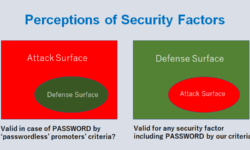Bart Shields, CEO of Olympus Sky based in Poland and David Gell, CMO based in the United States, participates in Risk Roundup to discuss Autonomous Network Security.
Autonomous Network Security
The sophistication, speed, and scale of attacks are evolving rapidly in cyberspace. As new attack vectors are being introduced from cloud services, IoT devices, and more, they are creating security blind spots and making threat detection more difficult for humans to tackle on their own.
Since the task of responding to these cyber-attacks in real-time has become enormously complex, to offset these growing risks, artificial intelligence (AI) seems to have become an indispensable tool for security for every nation.
Trends across nations are driving towards automating network security decisions. The reason behind that is certificate-based protocols are proving costly and ineffective. Despite that most of the solutions today rely on certificate-based crucial public key infrastructure solutions.
Is Autonomous AI Needed in Cybersecurity?
When the internet of things is on its way to connecting cyberspace to aquaspace, geospace and space (CAGS) and individuals and entities across nations: its government, industries, organizations, and academia (NGIOA), large amounts of digital data is on their way to being produced. Since the growing data needs to be securely communicated, there is a need for evolution in how we secure our digital networks.
Automated and autonomous attacks will not just target emails and corporate and government networks, there will be attacks on infrastructure as well. As a result, there is a need for new security solutions. The reason is that humans alone cannot identify the elusive, uncommon behaviors suggestive of today’s secret assailant in cyberspace, or at least, not before it is too late. The global NGIOA/CAGS networks are simply too big and too complicated.
In an age where we will soon see algorithmic battles, machines fighting machines, it will far outpace human security teams’ ability to keep up. As a result, arming up with perhaps autonomous network security will be crucial to staying one step ahead of an ever-evolving intelligent adversary in cyberspace.
Since there is a growing belief that autonomous artificial intelligence is deeply needed for securing cyberspace, it is essential to evaluate:
- Do we need a fully automated and autonomous network defense system?
- Will autonomous AI become our first line of defense in cyberspace?
- What areas of cyberspace is the focus?
- What solutions are emerging?
With the advancements in autonomous technologies from across nations, it is projected that the future certainly holds the reality of Artificial Intelligence-driven cyber-attacks, where malware can self-propagate through a series of autonomous decisions and intelligently tailor itself to the parameters of the compromised system in order to become stealthier to dodge detection.
The time is now to evaluate the risks and rewards of autonomous network security!
For more, please watch the Risk Roundup Webcast or hear the Risk Roundup Podcast
About the Guests
Bart Shields has over 30-years of experience in wireless communication and transportation-related technologies. He is the CEO and CTO and co-founder of Olympus Sky Technologies, S.A., an innovative communication link security provider with offices in both California and central Poland.
David Gell has over 20-years of leadership success in mobile wireless, telecommunications, and consumer. He is the CMO of Olympus Sky.
About the Host of Risk Roundup
Jayshree Pandya (née Bhatt), Ph.D., is a leading expert at the intersection of science, technology, and security and is the Founder and Chief Executive Officer of Risk Group LLC. She has been involved in a wide range of research, spanning security of and from science and technology domains. Her work is currently focused on understanding how converging technologies and their interconnectivity across cyberspace, aquaspace, geospace, and space (CAGS), as well as individuals and entities across nations: their governments, industries, organizations, and academia (NGIOA), create survival, security, and sustainability risks. This research is pursued to provide strategic security solutions for the future of humanity. From the National Science Foundation to organizations from across the United States, Europe, and Asia, Dr. Pandya is an invited speaker on emerging technologies, technology transformation, digital disruption, and strategic security risks. Her work has contributed to more than 100 publications in the areas of science and commerce. She is the author of the books, Geopolitics of Cybersecurity and The Global Age. She writes about Artificial Intelligence on Forbes.
About Risk Roundup
Risk Roundup, a global initiative launched by Risk Group, is a security risk reporting for risks emerging from existing and emerging technologies, technology convergence, and transformation happening across cyberspace, aquaspace, geospace, and space. Risk Roundup is released in both audio (Podcast) and video (Webcast) format and is available for subscription at (Risk Group Website, iTunes, Google Play, Stitcher Radio, Android, and Risk Group Professional Social Media).
About Risk Group
Risk Group is a leading strategic security risk research and reporting organization.
Copyright Risk Group LLC. All Rights Reserved





 Geopolitical Cybersecurity is about a new anthropogenic global risk, and has to be addressed as such
Geopolitical Cybersecurity is about a new anthropogenic global risk, and has to be addressed as such